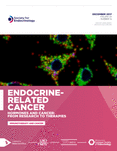Targeting CDK9: a promising therapeutic opportunity in prostate cancer
- Muhammed Hamidur Rahaman,
- Malika Kumarasiri,
- Laychiluh Mekonnen,
- Mingfeng Yu,
- Sarah Diab,
- Hugo Albrecht,
- Robert Milne and
- Shudong Wang⇑
- M Rahaman, School of Pharmacy and Medical Sciences , University of South Australia Division of Health Sciences, Adelaide, Australia
- M Kumarasiri, School of Pharmacy and Medical Sciences , University of South Australia Division of Health Sciences, Adelaide, Australia
- L Mekonnen, School of Pharmacy and Medical Sciences , University of South Australia Division of Health Sciences, Adelaide, Australia
- M Yu, School of Pharmacy and Medical Sciences , University of South Australia Division of Health Sciences, Adelaide, Australia
- S Diab, School of Pharmacy and Medical Sciences , University of South Australia Division of Health Sciences, Adelaide, Australia
- H Albrecht, School of Pharmacy and Medical Sciences , University of South Australia Division of Health Sciences, Adelaide, Australia
- R Milne, School of Pharmacy and Medical Sciences , University of South Australia Division of Health Sciences, Adelaide, Australia
- S Wang, School of Pharmacy and Medical Sciences , University of South Australia Division of Health Sciences, Adelaide, 5001, Australia
- Correspondence: Shudong Wang, Email: Shudong.Wang{at}unisa.edu.au
Abstract
Cyclin dependent kinase 9 (CDK9) is a key transcriptional regulator and a lucrative target for cancer treatment. Targeting CDK9 can effectively confine the hyperactivity of androgen receptor and the constitutive expression of anti-apoptotic proteins; both being main causes of prostate cancer development and progression. In castrate resistant prostate cancer, traditional therapies that only target AR have become obsolete due to reprograming in AR activity to make the cells independent of androgen. CDK9 inhibitors may provide a new and better therapeutic opportunity over traditional treatment options by targeting both androgen receptor activity and anti-apoptotic proteins, improving the chances of positive outcomes, especially in patients with the advanced disease. This review focuses on biological functions of CDK9, its involvement with AR, and the potential for therapeutic opportunities in prostate cancer treatment.
- Received 26 May 2016
- Revision received 25 August 2016
- Accepted 31 August 2016
- Accepted Preprint first posted online on 31 August 2016












